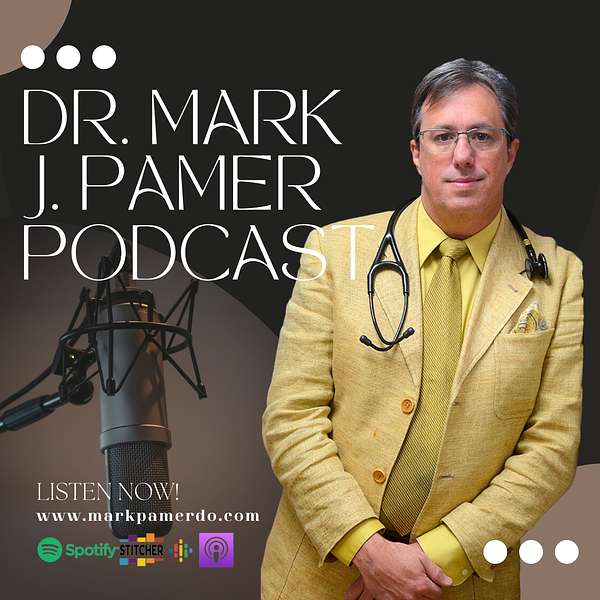
Dr. Mark J. Pamer Podcast
This podcast strives to provide answers to common pulmonary questions as well as introduce the community to Dr. Pamer, a doctor who shows genuine care for each and every patient.
Dr. Pamer is the hometown Pulmonologist who uses his heart to treat your lungs. Bringing his spirit of compassion to hosting the Dr. Mark J. Pamer Podcast, Dr. Pamer is joined by his co-host, Garfield Bowen, to discuss a broad range of topics. With nothing but improving your respiratory health in mind, the Dr. Mark J. Pamer Podcast brings awareness to such issues as COPD, Interstitial Lung Disease, Asthma, Allergies, and more! The show also discusses the treatments Dr. Pamer offers at his state-of-
the-art facility in Port St. Lucie. Listen in now!
Dr. Mark J. Pamer Podcast
Unlocking the Breath: How Stress Affects Respiratory Health with Dr. Mark J. Pamer
Can Stress Cause Lung Issues?
Stress might be the unseen thief of your breath, but not anymore after you tune into our heart-to-heart with Dr. Mark J. Pamer. This episode peels back the layers of how emotional strain can lead to physical manifestations within the lungs, such as asthma attacks and vocal cord dysfunction. Dr. Pamer's insights into the physiological spiral that stress initiates, from hyperventilation to the nuances of respiratory alkalosis, are not only profound but also immensely practical for everyday wellness.
Join us as we explore with Dr. Pamer the often-overlooked ways that psychological stresses can weaken immune defenses, paving the way for viral reactivations and susceptibility to new infections. Discover how stress-induced behaviors, like reaching for comfort foods or cigarettes, can add to the burden on our lungs. For anyone seeking to understand the complex dance between mind and body, or looking to safeguard their respiratory health against the backdrop of life's inevitable challenges, this conversation is an invaluable resource.
To learn more about Dr. Pamer, go to:
https://www.markpamerdo.com/
Dr. Mark J. Pamer DO
573 NW Lake Whitney Place, Suite 105
Port Saint Lucie, FL 34986
(772) 785-5864
Welcome to the Dr Mark J Pamer podcast, a doctor who uses his heart to treat your lungs. Here's your host, Dr Mark J Pamer.
Speaker 2:Is stress taking your breath away? Find out in an eye-opening interview with a top Port St Lucie lung doctor. Welcome back everyone. Garfield Bowen Cole slash producer. Back in the studio with Dr Mark Pamer. Dr Pamer, how are you doing today?
Speaker 3:I'm stressed, and I'm short of breath, garfield.
Speaker 2:So Dr Pamer tell me can stress cause lung issues?
Speaker 3:Yeah, absolutely. I'm glad you said lung issues and not lung disease. But it absolutely can cause lung issues. You're spot on, it certainly can. It wouldn't cause lung disease. I mean, I guess you could make the argument it could, but we'd have to go off on a bridge and you know it'd be a road. It'd be a long road, but let's just say you got underlying lung issues.
Speaker 3:You know asthma. It is well established that. You know high anxiety, emotional stress, could trigger asthma. I mean, that's well known. Certainly there's conditions vocal cord dysfunction, now called inducible or angio obstruction where emotional stress could trigger that. And you know the throat's closing, the vocal cords are closing.
Speaker 3:A person's short of breath, can't breathe. Certainly, hyperventilation during periods of anxiety, panic attacks, absolutely people get short of breath. They just know they're short of breath. They don't realize they're hyperventilating. I'll ask them you know, do you get numb around your lips? Do you get numbness on the fingertips, the toes? Is there cramping in the hands and the feet? They're developing a respiratory alkalosis. They're hyperventilating, their calcium levels drop and they get what we call paresthesia. That's from hyperventilation. That's usually stress-induced.
Speaker 3:Stress can certainly impair immunity. We know that. Everybody knows that that's usually stress-induced. Stress can certainly impair immunity. We know that, everybody knows that. That's absolutely true. And once your immune system is impaired, all kinds of things can happen and that can set a person up for reactivation of existing viruses. It doesn't even have to do with the lungs. I mean, how many people have you seen shingles come out on because they've been stressed? But you know there can be reactivation of viruses, reactivation of underlying issues, the asthma. But you know, with impaired immunity it can set you up to get infected by pathogens. And people just in an anxious state may just manifest with increased shortness of breath. Further, you know, when they're stressed out, they may eat, put weight on, they got any heart failure, they put fluid weight on, they're getting short of breath. It may worsen their cough. There's certainly psychogenic cough, I see it. People just seem to manifest their anxiety as a cough. There's plenty of ways that stress can manifest. It shortens the breath cough, wheeze, chest tightness, throat closing, hyperventilation, increased illness. Absolutely, absolutely.
Speaker 2:I guess people smoke when they're stressed out too. Huh, yep, that's a good point. Don't smoke, listen. Great job, dr Pamer. Enjoy the rest of your day. We'll see you in the next episode.
Speaker 1:Thank you, sir. Thanks for listening to the Dr Mark Jpamerdocom. Or call 772-785-5864. Once again, that's 772-785-5864.